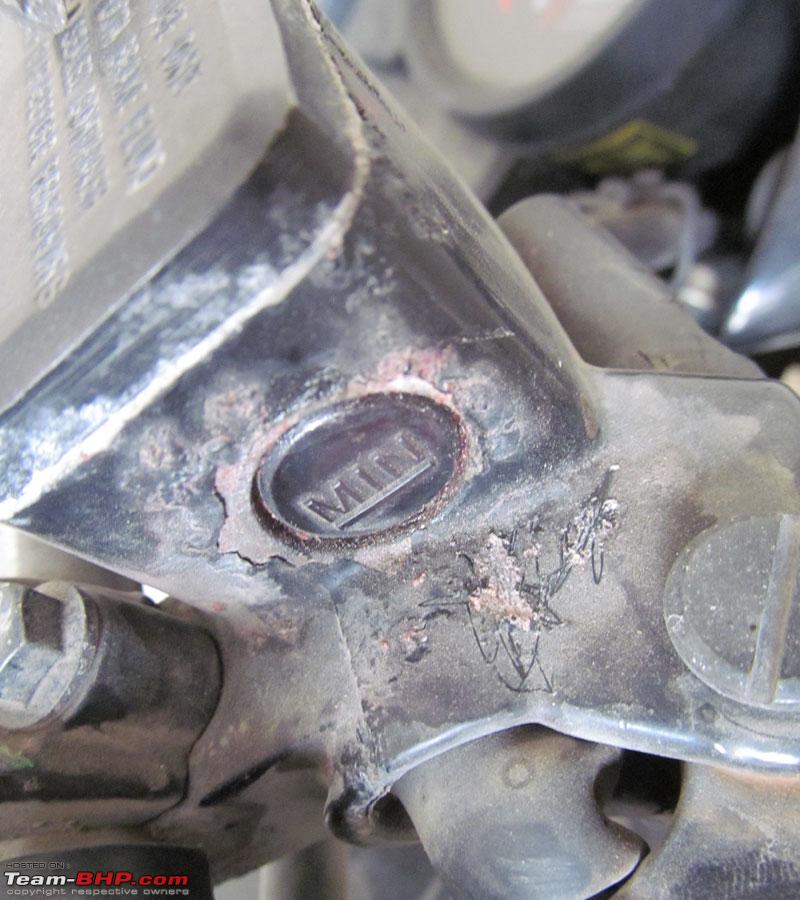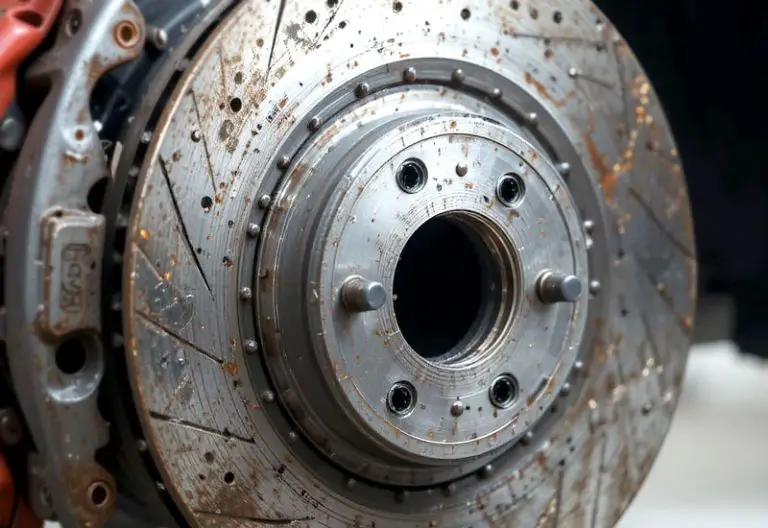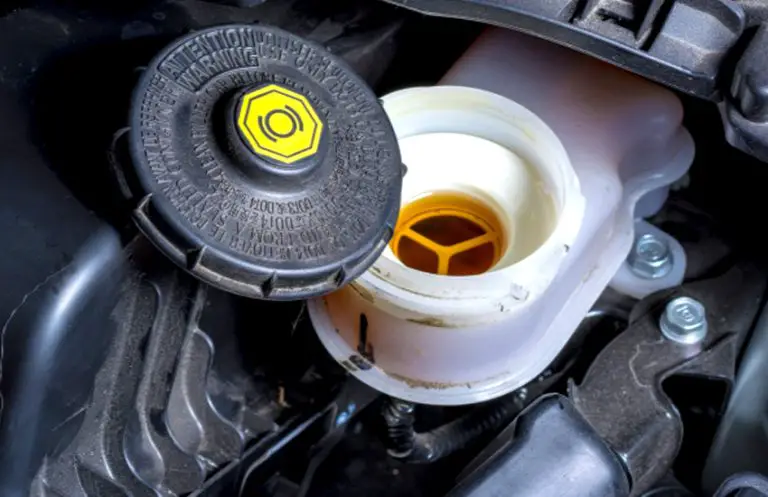Brake fluid can cause metal to rust if it remains in contact with the metal surface for an extended period. This occurs due to brake fluid’s corrosive properties, leading to oxidation of the metal.
Rusting can compromise the structural integrity and safety of the metal components in a vehicle. It is essential to maintain proper care and inspection of brake systems to prevent rust formation and ensure optimal performance. Regular checks and timely replacement of brake fluid can help prevent rusting and prolong the lifespan of metal components in a vehicle, ensuring safe and efficient operation.
Compatibility Of Brake Fluid With Metals
Brake fluid is an essential component of a vehicle’s hydraulic brake system, responsible for transmitting force from the driver’s foot to the brakes. When it comes to the compatibility of brake fluid with metals, it’s crucial to understand how different metals used in brake systems are affected by brake fluid and its potential to cause rust.
Types Of Metals Used In Brake Systems
Brake systems utilize various metals, each with unique properties and susceptibility to corrosion. The most common metals used in brake systems include:
- Steel
- Cast iron
- Aluminum
- Copper
Effects Of Brake Fluid On Different Metals
Brake fluid interacts differently with various metals, and its compatibility can significantly impact the overall performance and longevity of the brake system.
| Metal | Effect of Brake Fluid |
|---|---|
| Steel | Brake fluid is compatible with steel, as it does not cause significant corrosion. However, prolonged exposure can lead to rust formation. |
| Cast iron | Cast iron is highly resistant to brake fluid, making it a suitable choice for brake system components. |
| Aluminum | Brake fluid can cause corrosion on aluminum components, potentially leading to leaks and reduced structural integrity. |
| Copper | Copper is not compatible with most brake fluids, as it can rapidly corrode when exposed to brake fluid, leading to system failure. |

Credit: www.ebay.com
Corrosion And Rust Formation
Corrosion and rust formation are common concerns when it comes to metal objects. When certain factors like moisture and oxygen come into contact with metal, it undergoes a chemical reaction known as corrosion or rusting. In the context of vehicles, brake fluid plays a crucial role in the functioning of brakes. But have you ever wondered if brake fluid can cause metal to rust?
How Corrosion Occurs In Metal
Corrosion occurs when metals react with their environment, resulting in the formation of metal oxides or salts. Moisture and oxygen play a significant role in this process. When unprotected metal is exposed to these elements, it creates an ideal environment for corrosion to take place.
During corrosion, moisture in the air or water causes metal particles to break down. This process deteriorates the integrity of the metal, leading to the formation of rust. As a result, the metal weakens and becomes vulnerable to further damage.
Connection Between Brake Fluid And Rust Formation
While brake fluid itself does not directly cause metal to rust, it can indirectly contribute to the corrosion process. Brake fluids are hygroscopic, meaning they have the ability to absorb moisture from the surrounding environment. Over time, moisture can find its way into the brake system, primarily through tiny cracks or damaged seals.
When brake fluid absorbs moisture, it becomes contaminated. This contaminated brake fluid can then act as a catalyst for corrosion. In the presence of moisture and oxygen, the combination of contaminated brake fluid and metal can accelerate the corrosion process.
In addition, certain brake fluids, such as DOT 3 and DOT 4, contain glycol-based additives. These additives can be corrosive to certain metals, especially if exposed for prolonged periods. This further enhances the likelihood of rust formation.
To prevent or minimize the risk of rusting caused by brake fluid, it is important to follow proper maintenance procedures. Regularly inspecting the brake system for any leaks, replacing brake fluid according to recommended intervals, and using the appropriate type of brake fluid can help maintain the integrity of the metal components and reduce the chances of rust formation.
In summary, brake fluid itself does not cause metal to rust, but its presence and the conditions under which it operates can contribute to the corrosion process. By adopting preventive measures and adhering to maintenance guidelines, you can help prolong the lifespan of metal components in your vehicle and avoid potential rust-related issues.
Prevention And Maintenance
Brake fluid can indeed cause metal to rust if it’s not properly maintained. Moisture can accumulate in the fluid over time, leading to corrosion of metal components in the braking system. Preventing rust involves regular brake fluid checks and timely replacement to ensure optimal performance and longevity of the brakes.
Best Practices For Preventing Rust In Brake Systems
Importance Of Regular Maintenance
To prevent rust in brake systems, implementing best practices is crucial. Regular maintenance ensures longevity and performance.
Best Practices For Preventing Rust In Brake Systems
- Flush brake fluid regularly to remove contaminants
- Use high-quality brake fluid to prevent corrosion
- Inspect brake components for signs of rust
Importance Of Regular Maintenance
- Regular maintenance prevents deterioration of brake components
- Ensures optimal brake performance and safety
Preventing rust in the brake system is essential for safety and performance. Regular maintenance and following best practices can help in preserving the integrity of the metal components.

Credit: www.team-bhp.com
Environmental Impact
Rust Formation due to Brake Fluid can negatively impact the environment by polluting soil and water sources.
Impact Of Rust On The Environment
- Rust from metal due to brake fluid can contaminate soil and water, harming plants and aquatic life.
- Corrosion caused by rust can damage infrastructure and lead to costly repairs.
Proper Disposal Of Old Brake Fluid
- Ensure to collect old brake fluid in a sealed container to prevent leaks.
- Take it to a certified disposal facility for proper handling and recycling.
Safety Concerns
Brake fluid does not cause metal to rust as it is designed to protect against corrosion.
Risks Associated With Rust In Brake Systems
Rust in brake systems is a serious concern that can compromise the safety of your vehicle. It can weaken the structural integrity of various components, leading to brake failure and potentially disastrous consequences. Let’s take a look at some of the risks associated with rust in brake systems:
- Risk #1: Decreased braking performance: When rust forms on essential brake components such as calipers, rotors, or brake lines, it can hinder their ability to function properly. This can result in increased stopping distances and reduced braking power, making it more difficult to control your vehicle.
- Risk #2: Structural damage: Rust can eat away at the metal surfaces of brake components, causing them to weaken and even fail. The structural damage caused by rust can lead to brake pedal sponginess, loss of brake pressure, or even complete brake system failure.
- Risk #3: Corrosion of brake fluid: Rust particles in the brake system can contaminate the brake fluid. This can lead to the formation of corrosive substances that further damage the components, accelerating the rusting process. Corroded brake fluid can also negatively impact the effectiveness of the braking system.
- Risk #4: Brake line failure: Brake lines are responsible for transferring hydraulic pressure from the brake pedal to the brake components. When rust forms on the brake lines, it can weaken their structural integrity and cause them to leak or rupture. Brake line failure can result in a complete loss of braking ability.
Ensuring Safe Handling Of Brake Fluid
Proper handling of brake fluid is crucial for maintaining a safe braking system. By following these guidelines, you can minimize the risks associated with brake fluid and protect the integrity of your brake system:
- Use the right type of brake fluid: Different vehicle manufacturers may recommend specific types of brake fluids for their vehicles. Always refer to your vehicle’s owner’s manual to ensure you are using the correct type of brake fluid.
- Check for contamination: Brake fluid can become contaminated with moisture and debris over time. Regularly inspect the brake fluid for any signs of discoloration, cloudiness, or particles. If you notice any abnormalities, it is important to have the brake fluid flushed and replaced.
- Store brake fluid properly: Brake fluid should be kept in a sealed container in a cool and dry place. Exposure to air, humidity, and extreme temperatures can degrade its quality and effectiveness. Always ensure the cap is tightly sealed to prevent moisture absorption.
- Handle with care: When handling brake fluid, it is important to wear protective gloves and goggles. Brake fluid can be harmful if it comes into contact with your skin or eyes. In case of accidental contact, rinse with plenty of water and seek medical attention if necessary.
- Dispose of brake fluid responsibly: When disposing of brake fluid, it is essential to follow local regulations and guidelines. Do not pour brake fluid down the drain or into the soil, as it can contaminate water sources and harm the environment.
Regulatory Standards
Rust is a common concern when it comes to brake fluid and its impact on metal components. Understanding the regulatory standards for brake fluid composition and industry standards for rust prevention is crucial for ensuring the longevity and safety of braking systems.
Regulations For Brake Fluid Composition
Regulatory standards dictate the composition of brake fluids to ensure their proper functioning and compatibility with braking system components. The Society of Automotive Engineers (SAE) has established specifications for the chemical properties and performance requirements of brake fluids. These standards address issues such as boiling point, viscosity, and the materials used in brake fluid formulations.
Industry Standards For Rust Prevention
Industry standards in the automotive sector aim to mitigate the potential for rust formation in braking system components. Various organizations, such as the International Standards Organization (ISO) and the Automotive Industry Action Group (AIAG), have developed guidelines for manufacturers to adhere to in preventing corrosion. Requirements may include the use of corrosion inhibitors and regular testing for the presence of harmful contaminants that could lead to rust formation.

Credit: www.amazon.com
Conclusion
Brake fluid can indeed cause metal to rust over time due to its hygroscopic nature. When moisture enters the braking system through the fluid, it can lead to corrosion and ultimately rust. To prevent this, regular maintenance and replacing the brake fluid as recommended by your vehicle’s manufacturer is crucial.
By taking these precautions, you can ensure the longevity of your brake system and minimize the risk of rust-related issues.


